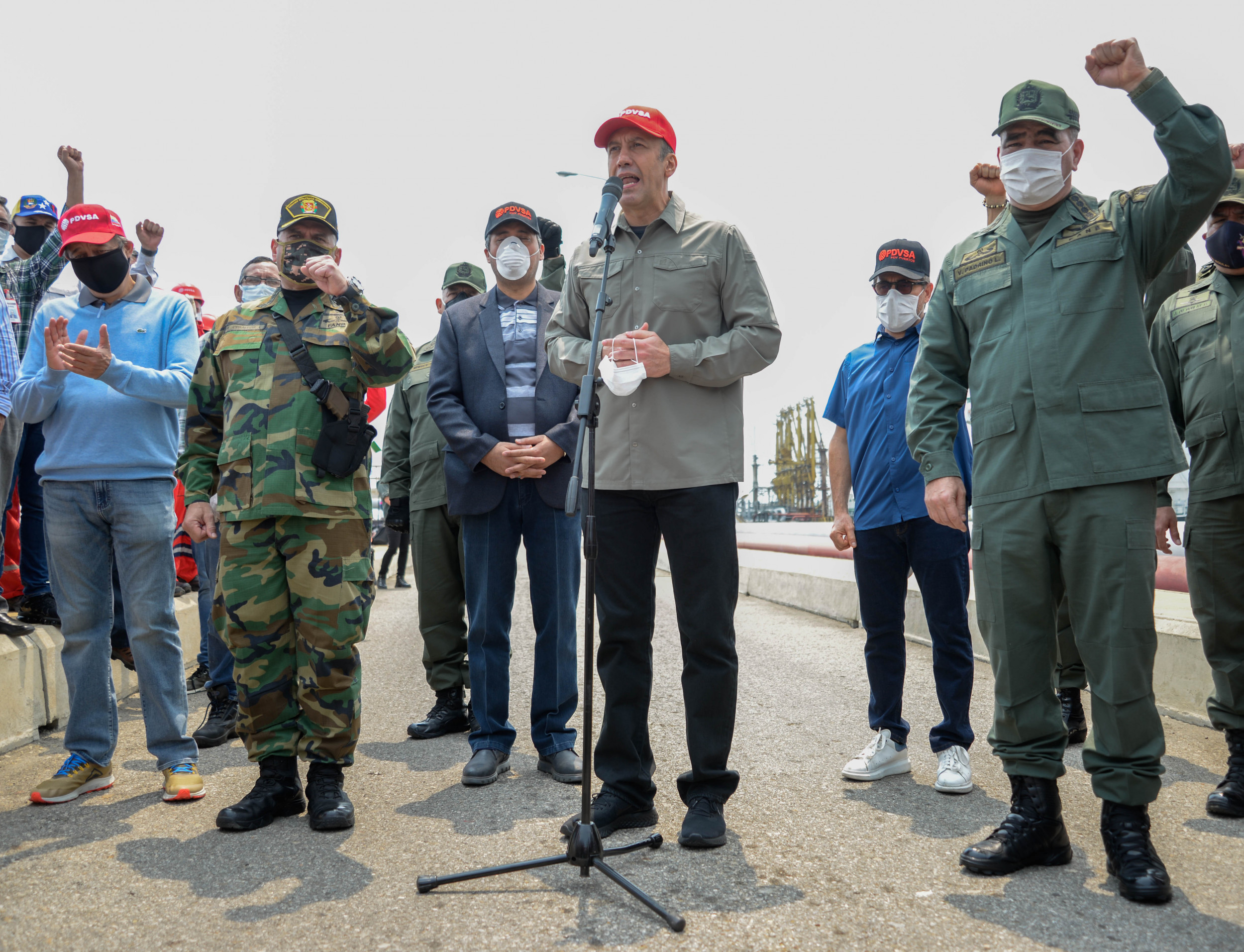Play all audios:
The arrival of Iranian fuel tankers to Venezuela has been hailed by officials from both countries as they look to resist threats of intervention against their trade by the United States.
Iranian President Hassan Rouhani accused the U.S. during a cabinet session Wednesday of seeking "to interfere in the normal trade between Iran and a friendly country in carrying an oil
product," something he argued "has nothing to do with them and is not compatible with any law." Without mentioning Venezuela by name, he referred to successful Iranian
shipments in the Caribbean, where at least three of five tankers have already entered the waters off the socialist-led, fuel-starved Latin American nation. "If there was no unity within
the country among the government, other forces and the armed forces, the Americans might have succeeded in their aggression and another Gibraltar may have been witnessed in the Caribbean,
but unity and solidarity prevented such a thing from happening," he added, referring to the United Kingdom's seizure last year of an Iranian vessel accused of carrying oil to
Syria, which is subject to foreign sanctions. President Donald Trump's administration has placed heavy trade restrictions on the petroleum industries of both Tehran and Caracas, seeking
to restrict their abilities to engage in international commerce over policy differences. Also on Wednesday, Venezuelan ambassador to Iran Carlos Alcalá Cordones told the semi-official
Tasnim News Agency that receiving Tehran's shipment meant Caracas "has raised its flag of struggle against the imperialist power of the United States, which has tightened its grip
on our economic progress by imposing coercive and unilateral actions by the United States" He said the group of Iranian tankers signifies the "courage of the people through their
governments, becoming more than anything a symbol of solidarity between the brotherly countries, and reflecting the fighting spirit of the two nations." He too lambasted U.S.
"aggression" across the globe. Officials from Caracas and Tehran spoke out last week after Reuters cited a senior Trump administration official who said the U.S. was considering
measures to halt a gold-for-fuel arrangement between Iran and Venezuela. State Secretary Mike Pompeo announced new restrictions days later against Chinese companies doing business with
Iranian airliner Mahan Air over allegations it was involved in a plan "to facilitate shipments to Venezuela to support the illegitimate former Maduro regime and its desperate attempts
to boost energy production, which had fallen due to its own gross mismanagement." The State Department did not immediately respond to _Newsweek_'s request for comment, though U.S.
officials have described Maduro as corrupt and guilty of both electoral fraud and narcoterrorism. Venezuela rejects these accusations. Trump has ramped up sanctions against Venezuelan
President Nicolás Maduro since 2017 and cut ties entirely with his administration last year, instead endorsing opposition-controlled National Assembly leader Juan Guaidó. The country's
economy faces collapse as it suffers from hyperinflation and supply shortages. The White House has also launched a maximum pressure campaign against Iran since leaving a multilateral nuclear
treaty in 2018. Washington has accused the Islamic Republic of using sanctions relief to support foreign militias, develop ballistic missile technology and establish nuclear weapons
capabilities—something Iran has denied seeking. Pompeo announced an end Wednesday to all existing sanctions waivers for countries engaged in products related to the Iranian nuclear deal
still supported by China, France, Germany, Russia and the United Kingdom, as well as Iran itself. With U.S. and Iranian forces already having been recently engaged in tense encounters in the
Persian Gulf, concerns of a confrontation in the Western Hemisphere have been raised since Trump announced last month the deployment of enhanced counternarcotics operations in the Caribbean
and Eastern Pacific that U.S., Venezuelan and Cuban officials told _Newsweek_ would be used to pressure Maduro and distract from the ongoing novel coronavirus crisis. The stakes were
heightened after two U.S. nationals were arrested as part of a failed rebel incursion into Venezuela. The State Department has accused Caracas and Havana of orchestrating a disinformation
campaign surrounding the incident, an allegation officials from the two leftist governments told _Newsweek_ they reject.

